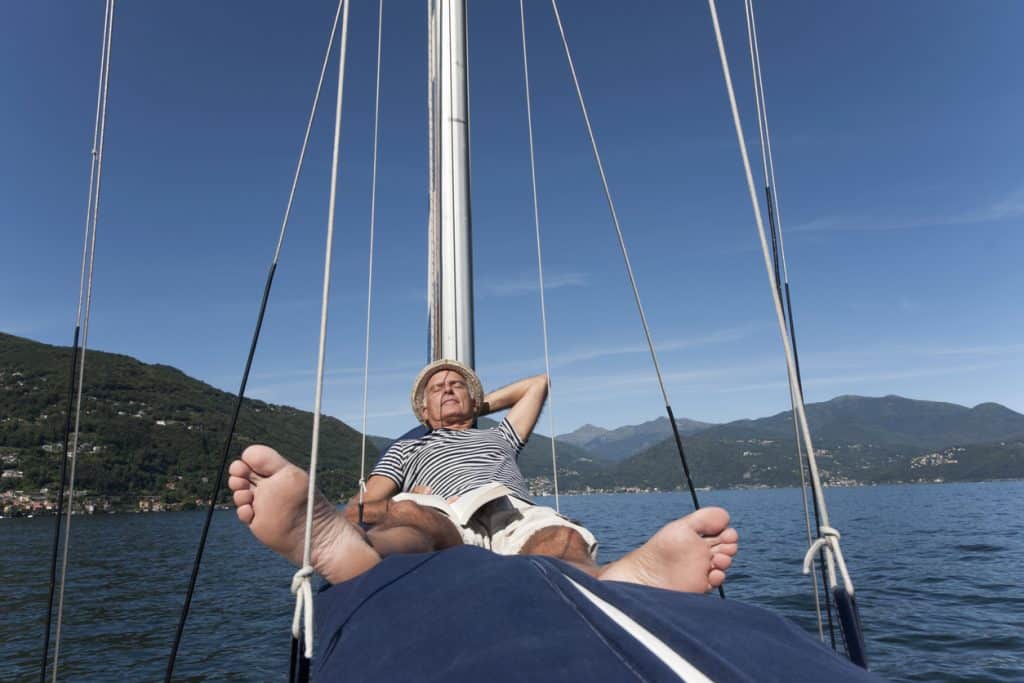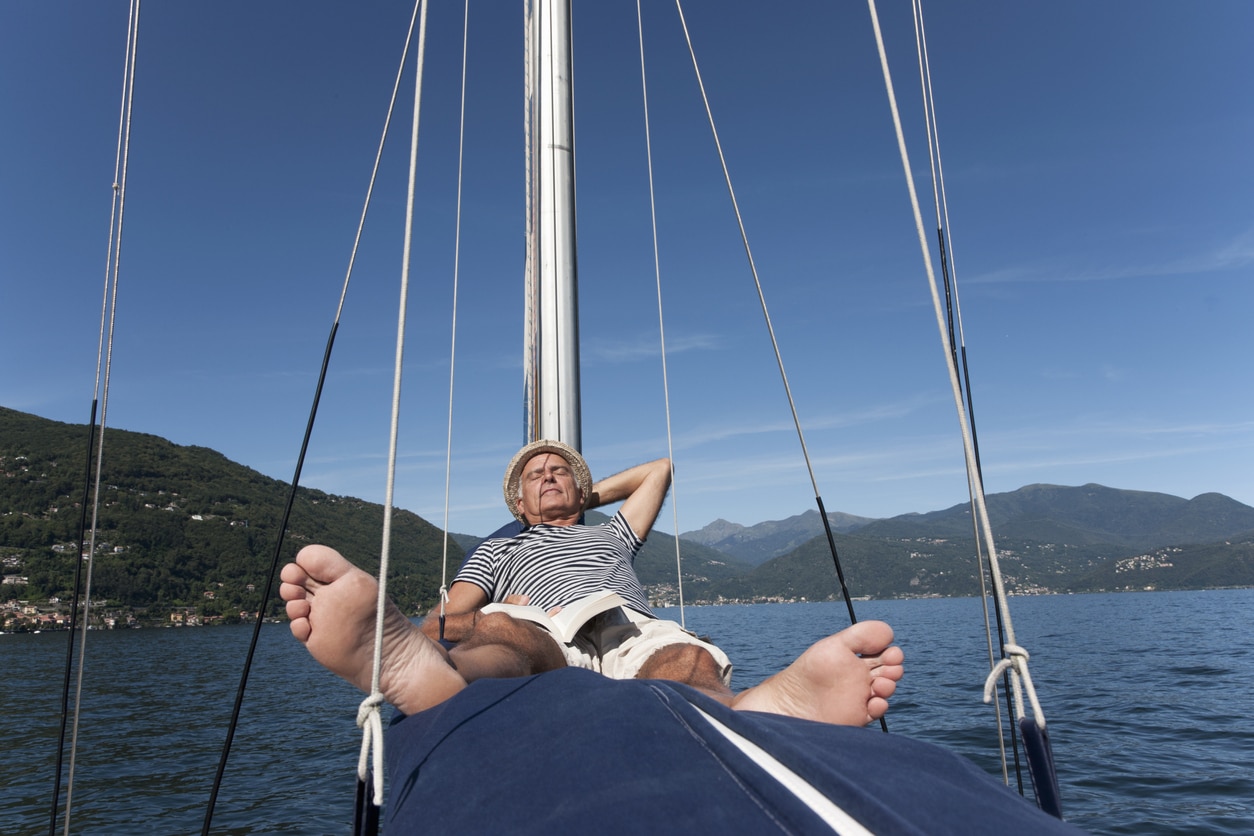Ahh, sailing. There’s nothing quite like being out on the open water, feeling the wind in your hair and the sun on your face. But there’s one downside to sailing that can’t be denied: it can be really, really tiring. Have you ever gone for a sail and then afterward felt like you could take a nap for hours? Well, there’s a scientific reason for that. Here’s why sailing makes you tired.
Is sailing physically demanding?
The level of physical effort required by sailing actually varies a lot depending on the type of sailing that you are doing.
For instance, if you are just cruising around on a small boat in calm waters, it’s not going to take much effort at all. But if you are sailing in choppy water or windy conditions, it can be quite strenuous.
And even if you’re not exerting yourself physically, being out on the water can be mentally demanding. There are a lot of things to pay attention to, such as the wind direction, the weather, other boats, and your own boat’s trim. All of this can be mentally exhausting, even if you’re not physically exerting yourself.

What is boater’s fatigue?
Boater’s fatigue is a type of fatigue that can affect both experienced and inexperienced sailors alike. It is caused by a combination of physical and mental exhaustion, as well as dehydration and exposure to the sun and explains why being on a boat can make you tired.
Symptoms of boater’s fatigue include tiredness, irritability, headache, dizziness, and difficulty concentrating. It can slow your reaction time and increase the risk that you might lose focus – especially if you are sailing for long periods without a break. If you are suffering from boater’s fatigue, it is important to take a break, drink plenty of fluids, and get out of the sun.
Boater’s fatigue is often referred to as “sailor’s sleep” because it can be so debilitating that it can make you feel like you need to take a nap. However, it is important to be aware of the signs of boater’s fatigue and to take a break before you become too exhausted.
Sailing can be a wonderful experience, but it’s important to be aware of the potential for fatigue. If you are feeling tired, take a break, drink plenty of fluids, and get out of the sun. And if you are feeling particularly exhausted, it might be time to head back to shore.
So why does sailing make you tired?
There are two main reasons for why sailing can make you tired. The first is that it can be physically demanding, and the second is that it can be mentally demanding.
When you are sailing, your body is using a lot of muscles that you don’t normally use when you are on land. This can lead to fatigue, especially if you are not used to using those muscles.
Sailing, like any form of exercise, will make you tired. But there’s more to it than that. Being on a boat, even a small one, can be demanding both physically and mentally. There’s the constant motion, the sun, the wind, and the waves. All of these factors can contribute to making you feel exhausted.
Physical activity
Sailing can be a physically demanding activity, using muscles that you don’t normally use. Even keeping yourself upright on a moving boat is more physically demanding than standing on solid ground, as your muscles have to work to balance you on the moving boat..
Going sailing means you need to constantly adjust the sails, trim the lines, and keep an eye on the wind and the waves. This requires a lot of strength and stamina, especially in choppy conditions.
Motion sickness
Sailing can be a lot of fun, but it can also make you feel incredibly tired. One reason for this is motion sickness, which is caused by the constant movement of the boat. As your body tries to adjust to the rocking motion, it expends a lot of energy, which can lead to fatigue. Additionally, the stress of motion sickness can also take a toll on your body, further adding to your fatigue. If you find yourself feeling tired after a day on the boat, don’t worry – it’s completely normal. Just be sure to take it easy and get plenty of rest. With a little time, your body will adjust to the motion of the boat and you’ll be ready to sail another day.
As well as the motion of the boat, you may also have to deal with vibration on board. This can cause fatigue body is trying to cope with the constant movement and noise.
Fresh air
Have you ever gone for a sail and felt incredibly tired afterwards? It turns out there’s a scientific reason for that! When you’re out on the open water, you’re exposed to fresh air and oxygen flow all around you. And, unlike the air in our homes or offices, fresh air is rich in oxygen. As your body takes in all that extra oxygen, it starts to work a little harder than usual. Your heart rate increases and your blood vessels dilate in an effort to deliver oxygen to your muscles. That extra work makes you feel tired, especially if you’re not used to being in such a low-oxygen environment. So next time you go for a sail, don’t be surprised if you find yourself feeling a bit fatigued afterwards. Just take it as a sign that your body is working hard to adjust to the new environment!
Read also: Why does fresh air make you tired?
Mental fatigue
In addition to the physical demands of sailing, there is also a mental element that can be tiring as you are constantly thinking of what needs doing, how to stay on course, and watching out for dangerous situations. Having to constantly be aware of your surroundings, sailing the boat safely, and making sure you don’t run into other boats or anything else can be mentally draining. The constant sun can also add to the mental fatigue.
Sun and wind
Sailing takes you out into the open air, where you’re exposed to both the sun and the wind. This can be a recipe for fatigue, as both sunlight and wind have drying effects. Sunlight also has a tendency to sap your energy, as your body works hard to keep cool in the heat. Meanwhile, being in constant contact with wind can lead to dehydration, as it causes you to lose water through evaporation.
Read also: Why does the sun make you tired?
Concentration
In addition to the physical effects of being out in the open air, there’s also a mental element to consider. After all, piloting a boat isn’t exactly a low-stress activity! Constantly keeping an eye on your surroundings and making sure you don’t run into any other boats or objects can be mentally draining. And if the weather takes a turn for the worse, you could find yourself in a very stressful situation indeed.
Why is sailing so relaxing?
We all know that feeling of complete relaxation when we’re out on the water. In fact, perhaps the best thing about sailing, whether it’s on the lake or ocean, is how relaxing it is. The gentle rocking of the boat, the sound of the waves, and the fresh air can make even the most stressed-out person feel at peace. But have you ever wondered why sailing is so relaxing?
Salt water air
It turns out there’s a science behind that feeling of relaxation we get when we’re sailing. According to studies, being in or near salt water helps to improve our mood and alleviate stress. That’s because the saltiness of sea air contains charged ions which help the body absorb oxygen more easily. This, in turn, balances our serotonin levels and makes us feel more relaxed.
Focusing the mind
In addition, being actively engaged in something like sailing—focussing on and enjoying the activity—is good for us as it gives our minds a break from the usual stressors we encounter in our daily lives. When we’re constantly bombarded with input from work, family, and social media, it can be hard to completely switch off and relax. But when we’re focused on learning a new skill or enjoying a hobby we love, it’s much easier to let go of all that unnecessary mental baggage and simply be in the moment.
So next time you’re feeling anxious or stressed, head to your nearest body of water and go for a sail! Not only will you get some much-needed fresh air and vitamin D, but you’ll also get to enjoy the wonderful feeling of relaxation that comes from being one with nature.
Read also: Why does fishing make you tired?
How to avoid getting tired while sailing
Now that we know some of the reasons why sailing can make us tired, let’s take a look at how we can avoid feeling fatigued while out on the water.
1. Stay hydrated
One of the best ways to avoid feeling tired while sailing is to make sure you stay hydrated. Drinking plenty of water throughout the day, and taking breaks regularly to rest and rehydrate, can help you avoid tiredness for longer periods of sailing. If you start to feel thirsty, that’s a sure sign that you’re already dehydrated, so make sure to drink up!
2. Apply sunscreen
Another good way to avoid getting tired while sailing is to apply sunscreen regularly. The sun can be very draining, so make sure to protect yourself from its harmful rays.
3. Take breaks
If you start to feel fatigued, take a break! Find a shady spot to rest in, or come inside the cabin for a while. It’s important to give your body and mind a break from the constant sun and wind. Sitting down in the shade can give our bodies a much needed rest from all the stimulation of sailing on the ocean.
4. Wear sunglasses
Wearing sunglasses will help to protect your eyes from the sun’s glare, and can also help to reduce eye fatigue. This can make your trip more enjoyable as well as less dangerous.
5. Bring snacks
Having some snacks on hand will help to keep your energy levels up. Choose healthy options like fruits and nuts, and avoid sugary snacks that will only make you feel more tired.
6. Avoid alcohol
It’s important to avoid drinking alcohol while sailing, as it will only make you feel more tired. Alcohol dehydrates the body and can also impair your judgment, making it more likely that you’ll make mistakes while sailing.
7. Dress in layers
Dressing in layers can help you to regulate your body temperature, which is important when you’re out in the sun all day. Wearing a hat and light, loose-fitting clothing will help to keep you cool, while a jacket or sweater can be added if you start to feel cold.
8. Move around
If you are sitting on a boat you may find that you are more alert if you take time to get up and pace around the vessel every hour or so. Doing so will increase your energy levels and help keep you awake.
Sailing is a great way to enjoy the outdoors, but it’s important to be prepared for the possibility of feeling tired. By following these tips, you can help to avoid fatigue and make the most of your time on the water.
Conclusion: Why does sailing make you tired?
So there you have it—the science behind why sailing makes you so tired! Next time you come back from a day out on the water feeling exhausted, just remember that it’s not just in your head. Your body and mind are working hard to keep you safe and sound while you enjoy the great outdoors.
